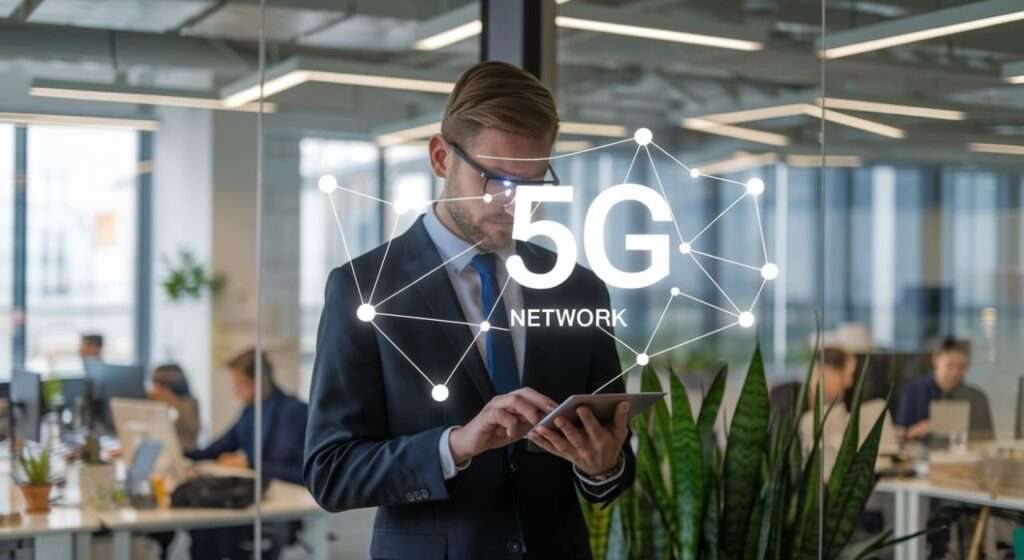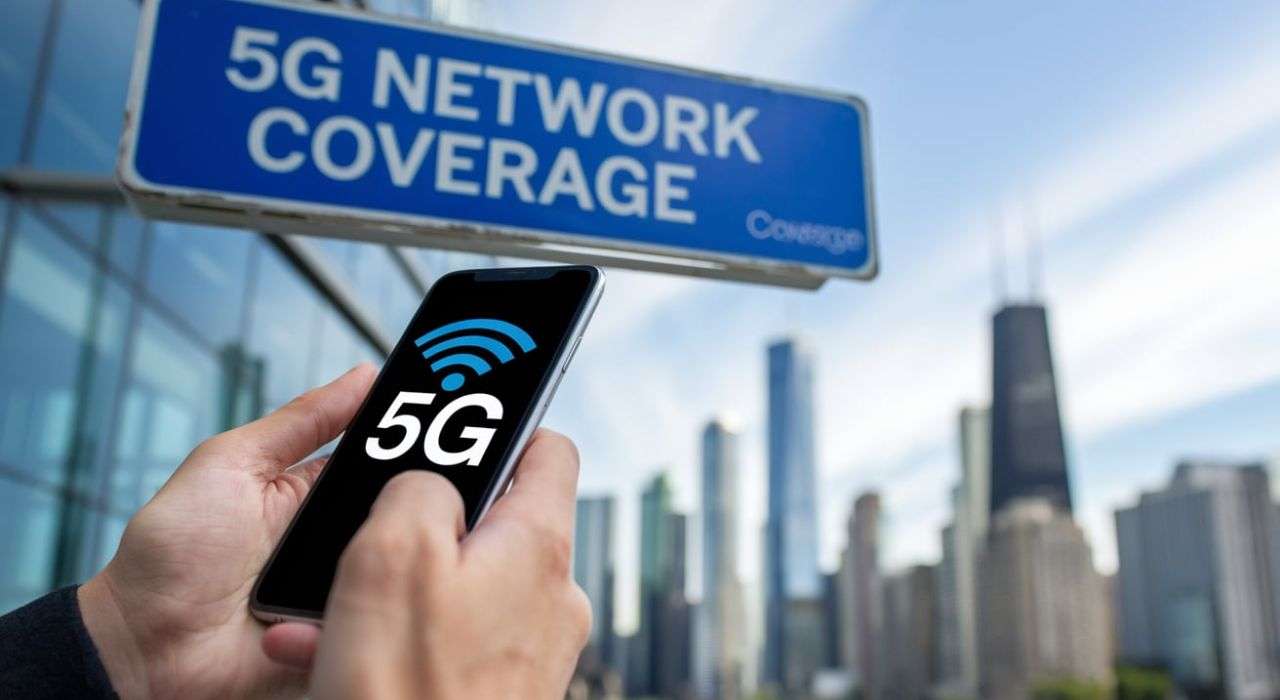Introduction
How Have Businesses Benefited from 5G Networks? What makes it more than just a faster internet connection? And how are companies using this technology to gain a competitive edge? These are the questions many are asking as 5G continues to make waves across industries.
The answer is simple: 5G is a game-changer. It’s not just about speed—it’s about unlocking new opportunities. From enabling real-time data sharing to powering advanced technologies like IoT and AI, 5G is helping businesses operate smarter, faster, and more efficiently than ever.
In this article, we’ll explore how companies are leveraging the power of 5G to boost innovation, improve operations, and enhance customer experiences. Get ready to discover the transformative impact of 5G on the future of commerce.
What is 5G?
5G, the fifth generation of wireless technology, is a significant leap from its predecessors. It offers unprecedented speed, reliability, and connectivity, enabling devices to communicate seamlessly. Think of it as upgrading from a bicycle to a race car—it’s faster, smoother, and more efficient.
Table of Contents
Transforming Business with 5G Technology

5G technology is revolutionizing how businesses operate by delivering faster speeds, lower latency, and improved connectivity. This innovation empowers companies to streamline operations, enhance customer experiences, and drive growth.
Unlocking New Opportunities through Network Slicing
Network slicing is revolutionizing connectivity by creating virtual networks tailored to specific needs. This technology allows enterprises to optimize resources, ensuring faster and more reliable connections.
By separating data streams, businesses can prioritize critical applications, enhancing efficiency. As industries increasingly rely on digital tools, network slicing becomes essential for staying competitive and future-ready.
Enhancing Connectivity and Efficiency for Modern Enterprises
- Network slicing provides enterprises with precise control over connectivity and performance.
- Businesses can allocate bandwidth dynamically based on user demand, minimizing bottlenecks.
- It is crucial for industries like healthcare, manufacturing, and finance, where low-latency and secure connections are essential.
- This technology enhances productivity by ensuring reliable and efficient network performance.
- By improving connectivity, enterprises can drive higher customer satisfaction.
The Economic Impact of 5G on Industries
5G technology is transforming industries by boosting efficiency, creating new opportunities, and driving economic growth. Its faster speeds and reliable connectivity are revolutionizing sectors like healthcare, manufacturing, and transportation.
Job Creation and Growth in the Digital Economy
The digital economy is driving massive job creation, reshaping industries across the globe. As businesses embrace technology, demand for roles in AI, data analytics, and cybersecurity skyrockets.
Startups and enterprises alike are hiring skilled workers to stay competitive. This evolution boosts economies, empowers innovation, and ensures sustainable growth in 2024 and beyond.
Revolutionizing Customer Experience with Ultra-Reliable low-latency
- Ultra-reliable low latency is revolutionizing real-time interactions with technology.
- Industries like healthcare, gaming, and e-commerce now offer seamless, interruption-free experiences.
- Faster response times boost user satisfaction, loyalty, and trust.
- This technology is becoming essential for delivering exceptional customer service.
- By 2024, it’s expected to be a global standard across industries.
Key Features of 5G Technology

5G technology is the next generation of wireless connectivity, offering faster speeds, lower latency, and better reliability. It supports seamless streaming, smarter devices, and advanced innovations like IoT and AI.
Speed, Capacity, and Reliability: The 5G Advantage
5G technology is transforming connectivity with faster speeds, low latency, and greater capacity. It enables instant downloads, smooth real-time responses for gaming and remote work, and supports more devices without lag.
Perfect for streaming, virtual meetings, and smart devices, 5G ensures stable connections even in crowded areas, making it a vital innovation for 2024 and beyond.
Enabling IoT Advancements and Smart Solutions
- 5G is the backbone of IoT, enabling real-time connections between billions of smart devices.
- It powers innovations like smart homes and autonomous vehicles, making everyday life simpler.
- With reliable performance, 5G helps businesses adopt advanced solutions.
- It boosts productivity and lowers costs through automation and efficiency.
- The future is smarter and more connected with 5G technology.
How 5G Drives Innovation Across Sectors
5G technology is revolutionizing industries by enabling faster internet, real-time data sharing, and seamless connectivity. From healthcare to smart cities, it drives innovation and creates new growth opportunities.
Transforming Healthcare, Manufacturing, and Beyond
Healthcare and manufacturing are being transformed by technologies like AI, automation, and IoT, improving efficiency and accessibility. In healthcare, AI aids diagnostics and telemedicine, while manufacturing benefits from robotics and real-time data.
By 2024, advancements in predictive analytics and smart systems will drive further innovation, making it essential for businesses to adapt and embrace these changes for sustainable growth.
The Role of 5G in Future-Proofing Businesses
- 5G delivers faster speeds, lower latency, and improved IoT connectivity, revolutionizing business operations.
- It enables smarter automation, real-time data processing, and greater efficiency across industries like healthcare, manufacturing, and retail.
- Small businesses benefit from 5G through easier scaling, seamless remote work, and advanced customer experiences with AR and VR.
- Adopting 5G drives innovation and supports business growth in an increasingly tech-driven world.
- Staying competitive in 2024 and beyond requires businesses to embrace the transformative power of 5G.
Preparing for a 5G-Enabled Future

5G technology is set to revolutionize how we connect, work, and live. With faster speeds and lower latency, it opens doors to smarter devices, better communication, and endless innovation. Preparing for a 5G-enabled future means embracing its potential while understanding its impact on businesses and daily life.
Strategies for Businesses to Leverage 5G Technology
In 2024, businesses can harness 5G technology to improve communication, enhance customer experiences, and optimize operations. Faster speeds and low latency enable innovations like augmented reality shopping, seamless remote work tools, smarter automation, and IoT integration.
Industries like retail, manufacturing, and healthcare benefit from real-time data sharing, improved productivity, and cost savings. As 5G adoption grows, businesses must also focus on cybersecurity to protect networks and maintain trust.
Overcoming Challenges in 5G Adoption and Implementation
- High Infrastructure Costs: The significant expense of building 5G networks is a major barrier to adoption.
- Regulatory Delays: Slow approvals and regulatory challenges are hindering progress.
- Skilled Workforce Shortages: A lack of trained professionals is limiting deployment and innovation.
- Cybersecurity Risks: Addressing potential vulnerabilities is critical for safe 5G implementation.
- Limited Rural Access: Expanding 5G coverage to underserved areas is crucial for widespread adoption.
Conclusion
5G technology is transforming businesses with faster speeds and minimal delays, enabling innovations like augmented reality shopping, remote work tools, automation, and IoT integration.
So, how have businesses benefited from 5G networks? Industries like retail, manufacturing, and healthcare are seeing real-time data sharing, higher productivity, and cost savings thanks to 5G.
While there are challenges like infrastructure costs, regulations, and cybersecurity, solutions such as partnerships and strong security measures can unlock their full potential, paving the way for seamless connectivity and innovation.
FAQs
Which industry will benefit most from the 5G network?
The industries that will benefit the most from 5G include healthcare, manufacturing, and transportation. 5G enables faster communication, remote surgeries, and real-time machine monitoring. Its low latency and high speed make it ideal for critical operations.
What are the benefits of a 5G network?
5G offers faster speeds, lower latency, and higher device connectivity compared to 4G. It improves streaming, gaming, and remote, work efficiency. Businesses also benefit from enhanced communication and smarter technology integration.
What are the potential benefits of 5G networks to the Internet of Things (IoT)?
5G can connect billions of IoT devices seamlessly with faster speeds and reduced delays. It supports smart homes, autonomous cars, and industrial automation. This improves efficiency and enhances smart device performance.
What does the quality of service (QoS) enable?
Quality of Service (QoS) ensures that critical applications get priority on the network. It helps maintain reliable performance for video calls, gaming, or streaming. This ensures a smoother user experience with minimal interruptions.
What does 5G edge computing do?
5G edge computing processes data closer to the device, reducing delays. It powers real-time applications like VR, IoT, and autonomous vehicles. This boosts speed, reliability, and overall network performance.
People also ask
1. How does 5G differ from 4G in business applications?
5G offers faster speeds, lower latency, and greater connectivity, enabling real-time operations and advanced technologies like IoT and AI.
2. What industries benefit the most from 5G networks?
Healthcare, manufacturing, retail, and logistics are among the top beneficiaries of 5G.
3. Are there any risks with 5G implementation for businesses?
Initial costs and infrastructure upgrades can be challenging, but the long-term benefits outweigh these risks.
4. How can small businesses afford 5G technology?
Small businesses can start by partnering with affordable providers and leveraging scalable 5G solutions.
5. When will 5G be fully accessible across the US?
While 5G is expanding rapidly, full nationwide accessibility is expected within the next few years.
